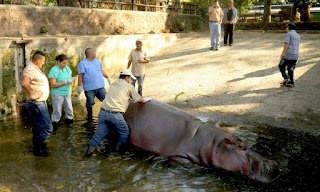No country for young hippopotamuses
A guest post by friend of the blog, Carlos Colorado
Occasionally, something happens in El Salvador so horrendous
that it provokes widespread indignation and soul-searching for the
constantly-tested yet surprisingly tender Salvadoran psyche. Such has been the case with the news that
Gustavito, the 15 year-old hippopotamus of the San Salvador zoo, was attacked
by unknown aggressors with icepicks, metal bars and stones in the wee hours of
Thursday, February 23. He died from his
injuries this past Sunday evening.
One of many
editorials decrying the incident declared El Salvador “The land of eternal
shame,” and questioned the moral fabric of a society wherein such an event
occurs. The editorial lamented that “not
only did Gustavito have to live like a Salvadoran, amid a great scarcity of
resources, but he had to die murdered in the middle of that spiral of hatred,
violence and blood that has accompanied us for almost four decades—first, the
Civil War violence, then the social violence” of gang crime. “We are a country,” the editorialists railed,
“which, before the eyes of the world, produces only death, violence and gangs. And our only import is immigrants fleeing
from poverty and maras.”
The editorial denounces Salvadoran society, which sees its youth
massacred every day, to the extent that it grows desensitized to their deaths; yet,
to cruelly attack a captive animal on display at a zoo seems like a new low
which disturbs the most hardened conscience.
“How do we justify that?”
The recriminations have reverberated on social media since
the weekend, with outraged and shocked citizens calling for the heads not only
of the attackers (about whom there seem to be no leads), but also of the zoo
security personnel and administrators, with many openly calling for the closing
of the zoo. To some extent, it seems
like a crime so perverse that it is impossible to limit the culpability to a
single person or group: it seems as if all of El Salvador is implicated in some
sort of communal guilt.
Obviously, much of that will be scaled back when the dust
settles, the shock subsides and the news can be seen with a due dosage of
perspective. However, one area in which
further reflection may be warranted is in the balance of urban Salvadoran
society with the natural environment. As
this blog recently
posted, there is a debate afoot about whether to restrict mining in El
Salvador, with the Roman Catholic Church pushing for a law to ban metallic
mining in the country.
As late as the middle of the 20th Century, El Salvador was a
largely rural country, in which coexistence with a somewhat varied fauna
(including, in some places, monkeys, jaguars and alligators) was part of the national
identity. As a result of overpopulation,
and the gritty onslaught of urban decay and social instability, El Salvador has
become a country of pollution-choked rivers, vanishing forests and mountains
being swallowed by hyper urbanization.
It has become—I hate to say it—no country for young hippopotamuses.
 |
| Gustavito |
Comments